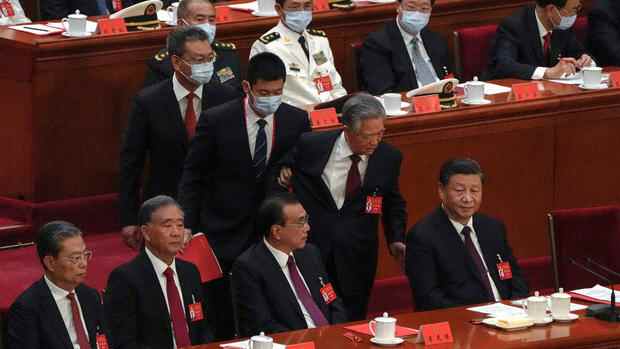Beijing The Congress of the Communist Party (CCP), which only takes place every five years, ended on Saturday with a demonstration of power by party leader Xi Jinping. The party enshrined its ideology and enduring leadership in the party statute. On Sunday, the new leadership of the party will be presented. It is considered certain that Xi will be confirmed for a third term as secretary-general.
A video of the final session in the Great Hall of the People caused a stir. It shows Xi’s predecessor as head of state and party, Hu Jintao, being escorted out of the hall. The 79-year-old, who is considered to be in poor health, seems to have reluctantly followed the request. Most of the leading cadres watched the scene without emotion. What the incident meant was initially unclear.
That the scene occurred after the press had been admitted suggests it was intended for the public. Hu is believed to be the head of the once-powerful Communist Youth League faction, which has lost much of its influence under Xi’s aegis. He stands for the old “collective” leadership model with representatives from different factions and with age and term limits, which Xi wants to overturn with his third term.
The conclusion of the congress had apparently been delayed. A closing speech by Xi Jinping was originally announced for the morning. For several hours, state-run TV stations aired expert talks and prepared pieces praising Xi’s achievements in the first ten years of his tenure as secretary-general.
Top jobs of the day
Find the best jobs now and
be notified by email.
At around 12:30 p.m. local time, it was then announced that the congress was over. Shortly before that, the video of Hu’s departure was circulating on Twitter, posted by representatives of the international media. The incident was not mentioned in China’s state media. Details of Xi’s speech are not yet known.
In response to the devastating consequences of Mao’s autocracy, which cost the lives of millions of Chinese, the party introduced the model of “collective leadership.” But since taking office in 2012, Xi has gradually undermined this model. He created numerous influential commissions, which he himself heads. That’s why he’s called the “chairman of everything”.
The approximately 2,300 delegates to the CCP Party Congress had met behind closed doors for a week. This is intended to set the framework for the development of the party and the country over the next five years. In addition, they determine the 20th Central Committee (ZK) from around 200 leading cadres, as well as the powerful Central Disciplinary Commission.
Xi could be confirmed as party leader for a third term on Sunday
The Central Committee appoints the so-called Politburo and its Standing Committee, the party’s supreme governing body. The new party leadership is to be presented to the public on Sunday. Observers hope that the composition of the standing committee will provide information about who could become the new prime minister next spring. The new leadership will be presented at the People’s Congress next year. However, in the People’s Republic, which is ruled by the Communist Party, party functions are significantly more important than government functions.
Premier Li Keqiang and Vice Premier Wang Yang, who are considered moderate, are no longer members of the next Central Committee, although they have not yet reached the unofficial age limit of 68. Experts interpret this as a sign that the important positions are likely to be filled by Xi loyalists, such as the chief ideologue Wang Huning or the head of the powerful Disciplinary Commission, Zhao Leji.
Unprecedented power for Xi Jinping
“The most important political innovation of this party congress cannot be found on paper: Instead of making room for a younger successor after two terms as Secretary General, Xi Jinping is setting himself up as his own successor,” says Katja Drinhausen from the China Institute Merics. Xi will wield power unparalleled in China since Mao Zedong.
>> Read also: President Xi’s claims to omnipotence are a disaster for Europe’s companies
Given the problems the country is grappling with, Xi Jinping’s full mandate is remarkable. The economic prospects of the second largest economy in the world have clouded over significantly.
The Chinese government’s adherence to the strict zero-Covid policy is strangling the domestic economy. Added to this is the ongoing crisis in the real estate market and the slowdown in global demand. The publication of data on economic growth in the third quarter, scheduled for last Tuesday, has been postponed without giving reasons.
China’s head of state and party leader was able to cement his power at the party congress.
(Photo: Reuters)
Added to this are the growing geopolitical tensions, particularly between the USA and China. The recently announced, far-reaching US export controls are a major setback for China’s chip ambitions and thus for the country’s technological development.
In his speech at the opening of the party congress last Sunday, party leader Xi emphasized several times that China wanted to become even “more independent and stronger in science and technology”.
With the exception of the so-called work report, the abridged version of which Xi Jinping read out at the opening of the party congress last Sunday, little information was released. The so-called work report provides a framework for developments over the next five years.
But it is intentionally very general and leaves much room for interpretation. Many of the goals mentioned will only be filled with content in the coming months and years.
More: Xi Jinping warns of “dangerous storms” and threatens Taiwan again
